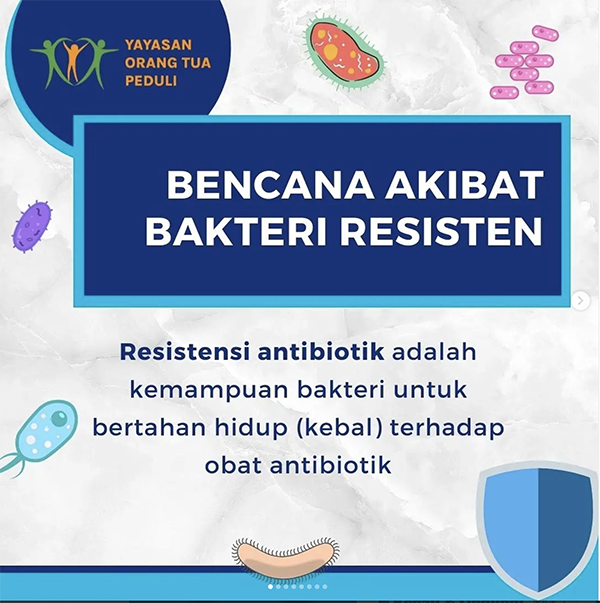2021-12-20
With activities on the ground in Ecuador, India, Indonesia, Zambia and Kenya - and with an increased online activity - ReAct leaves this year's World Antibiotic Awareness Week behind with hope for the future. A week of community engagement, interaction and intensified work on antimicrobial resistance is really motivating and strengthening - for a world free from untreatable infections. Learn more about a few of the different activities ReAct arranged during the week.

ReAct met students, children, held seminars, arranged community workshops, media workshops and civil society meetings and much more during this year’s World antimicrobial Awareness Week. Have a look below to get a glimpse of some of the ReAct highlights during the week.
List of all ReAct activities during World Antibiotic Awareness Week 2021, you also find contact information for each node.

WAAW LONG READ
Mobilizing communities to act on antibiotic resistance
The rapid spread of antibiotic resistance around the world has evoked calls at the highest levels of the United Nations and its member governments to urgently adopt measures to tackle the growing problem. While these and other global and national policy initiatives are highly welcome and much needed, the world cannot afford to solely wait for them to be translated into action and change on the ground.
The top-down approach needs to be complemented with action and mobilization on grass-root level since the emergence and spread of antibiotic resistance is tightly linked to the practices and behaviors of individuals.
Read full article: Mobilizing communities to act on antibiotic resistance

Press release
Unique collaboration between Ministry of Health, Zambia and ReAct Africa
Memorundum of Understanding (MoU) between Ministry of Health, Republic of Zambia and ReAct Africa
Lusaka, Zambia & Uppsala, Sweden, 18 November 2021 – The Zambia Antimicrobial Resistance Coordinating Committee (AMRCC) through the Zambia National Public Health Institute (ZNPHI) and ReAct Africa today announce the extension of their Memorandum of Understanding on supporting the implementation of Zambia’s Multi-sectoral National Action Plan on Antimicrobial Resistance. The renewed MoU extends support to the AMRCC and the Zambia strategic response program against antimicrobial resistance (ZSRA-AMR).

STUDENT COMPETITION
ReAct announces the top 15 teams to participate in Innovate4Health – the online global design sprint
The ReAct North America is mentoring student champions through Innovate4Health. Innovate4Health is a global student design sprint running from October 2021 to January 2022.
To tackle antimicrobial resistance, there is a need not only for bottom-up innovation but also for creatives ideas to the social and medical challenges of antimicrobial resistance and other emerging infections. Innovate4Health endeavors to enable students to not only take up these issues, but also play an active role in tackling them. Now we can present this year’s 15 teams and their projects.
Read full article: ReAct announces the top 15 teams to participate in Innovate4Health – the online global design sprint

BLOG POST
Could the best chemotherapy be an antimicrobial drug?
Marking the beginning of World Antimicrobial Awareness Week, Anna Zorzet and Scott Howard make the case that often the most important treatment for people with cancer are the drugs that cure their infections.
Full blog post: Could the best chemotherapy be an antimicrobial drug?

Go BLUE!
City of Hyderabad joins ‘Go Blue’ campaign as part of WAAW Activities
Several buildings in Hyderabad, capital of Telangana state in India, will be lit blue on 24 November as part of the World Health Organization’s ‘Go Blue’ campaign to raise awareness on antimicrobial resistance. ReAct Asia Pacific was one of the co-organizers among many other activities in the region set up by ReAct Asia Pacific.
Full article: City of Hyderabad joins ‘Go Blue’ campaign as part of WAAW Activities

Go Blue!
ReAct Europe and Uppsala University go blue to shed light on the antibiotic resistance issue
ReAct Europe and Uppsala University in Sweden are joining the World Health Organization’s WHO’s campaign Go-Blue, which sheds light on the silent pandemic that antibiotic resistance constitutes in the world. For two evenings, the University House and the ReAct Europe office is illuminated in blue, to urge the outside world to spread awareness about this threat to the world’s healthcare.
Full article: ReAct Europe and Uppsala University go blue to shed light on the antibiotic resistance issue

Photo competition
Winners ReAct Asia Pacific and Aspic Clubs photo competition 2021
During World Antimicrobial Awareness Week 2021 ReAct Asia Pacific and ASPIC Clubs organized the fifth edition of the photography competition for students. It was a tough call choosing between various entries on the theme of antibiotic resistance. In the end a total of four winners emerged for the top three prizes, with two sharing the third one. Full article: Winners ReAct Asia Pacific and Aspic Clubs photo competition 2021

Lessons learned ReAct Latin America Summit
5 lessons learned from Latin American Summit: Community empowerment – vital for tackling AMR
The Latin American Meeting “Empowered Communities facing antimicrobial resistance in the context of COVID-19”, organized by ReAct Latin America, the Pan American Health Organization and Florida International University, was held from 10 to 12 November. This Meeting analyzed the role of the community and its diverse forms of organization and wisdom in facing the pandemic. And how those actions can be taken as examples for addressing antimicrobial resistance, in particular antibiotics. Here are a few lessons learned from the meeting days, we also look into future approaches that might be of interest.
Full article: 5 lessons learned from Latin American Summit: Community empowerment – vital for tackling AMR

Webinar and media briefing in indonesia
Indonesia: Webinar for general public and media briefing
The Concerned and Caring Parents Foundation (YOP) in Indonesia held a public webinar on the threat of antimicrobial as the silent pandemic on Nov 7 attended by more than 250 participants. Participants included university students, parents, health workers from primary health centers, community health volunteers and representatives of faith-based organizations. The webinar was supported by ReAct, and a part of YOP’s educational sessions funded through a collaboration with the Ford Foundation and the Indonesian Ministry of Home Affairs. Two speakers for the webinar were Prof. Dr. dr. Rianto Setiabudi, SpFK(K), a professor in pharmacology, and YOP’s Founder and pediatrician dr. Purnamawati Sujud, SpA(K), MMPaed.
On November 23, YOP invited local journalists from Bali to a WAAW Media Briefing. Eleven journalists came from local newspapers, online media, and radio stations to discuss this year’s theme “Spread Awareness, Stop Resistance” and One Health approach with speakers from the chairperson of the Indonesian AMR Committee (KPRA), Dr. Anis Karuniawati, PhD, Sp,MK(K); Indonesian Ministry of Agriculture, Dr. Ni Made Ria Isriyanthi PhD; WHO Indonesia National Professional Officer for AMR, Dr. Benyamin Sihombing, MPH; FAO ECTAD Communication Officer, I Gusti Gayatri Kancana, and YOP’s Founder Dr. Purnamawati Sujud, SpA(K), MMPaed.
In addition, throughout November, YOP also shared information related to antimicrobial resistance on their social media accounts, particularly Instagram @milissehatyop, to raise awareness on resistance and antibiotic use.
More news and opinion
- Winners ReAct Asia Pacific and Aspic Clubs photo competition 2021
- ReAct Africa Conference: Key takeaways and way forward
- World Health Assembly Special Session 2: Openings for stronger governance of the silent antibiotic resistance pandemic
- Staff interview Juan-Carlos Lopez
- ReAct highlights during World Antibiotic Awareness week 2021
- Staff interview Maria Pränting
- 5 lessons learned from Latin American Summit: Community empowerment – vital for tackling AMR
- The WHA74 Special Session on Pandemic Preparedness and Response – an opportunity to address antibiotic resistance
- ReAct announces the top 15 teams to participate in the online global design sprint Innovate4Health 2021
- City of Hyderabad joins ‘Go Blue’ campaign as part of WAAW Activities
- ReAct Europe and Uppsala University go blue to shed light on the antibiotic resistance issue
- Could the best chemotherapy be an antimicrobial drug?
- Press release: Unique collaboration between Ministry of Health, Zambia and ReAct Africa
- Mobilizing communities to act on antibiotic resistance
- ReAct activities for World Antimicrobial Awareness Week 2021
- Dr Vijay Yeldandi
- 4-day Summit: Latin America discusses the role of the community in National Action Plans on AMR
- The world needs new antibiotics – so why aren’t they developed?
- 3 ways the new WHO costing & budgeting tool supports AMR National Action Plan work
- 5 years after the UN Political Declaration on AMR – where are we now?
- Víctor Orellana
- Local production of vaccines and medicines in focus: Key points from ReAct and South Center UN HLPF side-event
- Behavior change to manage antimicrobial resistance: 8 briefs and 1 webinar-launch by Uppsala Health Summit
- ReAct and ICARS to develop policy guides and tools for low resource settings
- Tapiwa Kujinga, Director of PATAM: In Zimbabwe civil society is involved in every aspect of the response to AMR
- COVID-19: India pays a high price for indiscriminate drug use
- Lancet Global Health article release: Resetting the agenda for antibiotic resistance
- 3 key takeaways for AMR from this year’s World Health Assembly WHA74
- Antibiotic resistance – far more than a medical problem
- UN High-level Dialogue on AMR: political will and investments needed
- Resetting the agenda for antibiotic resistance through a health systems perspective
- 3 questions to newly appointed STAG-AMR members Otridah Kapona and Sujith Chandy
- Walk the talk: time is ticking for all to act on antibiotic resistance!
- Vanessa Carter: 3 years of surviving a drug-resistant infection made me want to create change
- Upcoming ReAct Webinar: Expert Conversation about new report
- ReAct report: Governments need to take more leadership to ensure global sustainable access to effective antibiotics
- 4 considerations for addressing antimicrobial resistance through pandemic preparedness
- Preventing the next pandemic: Addressing antibiotic resistance
- 4 key takeaways from the virtual ReAct Africa Conference 2020
- The threat of the unknown: is lack of global burden data slowing down work on antibiotic resistance?
- ReAct input to the WHO Executive Board Session on Antimicrobial Resistance
- Dr Gautham: informal health providers key to reducing antibiotic use in rural India
